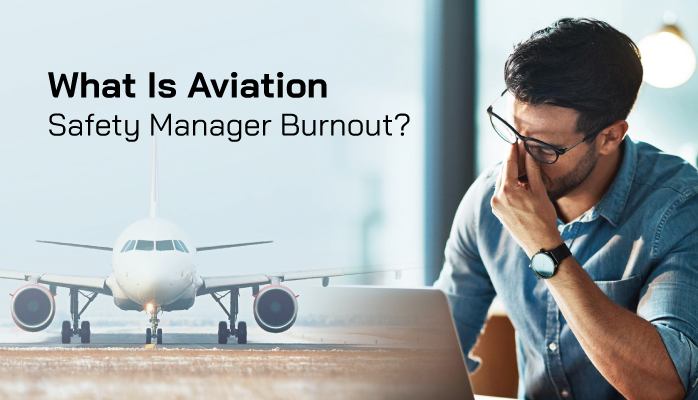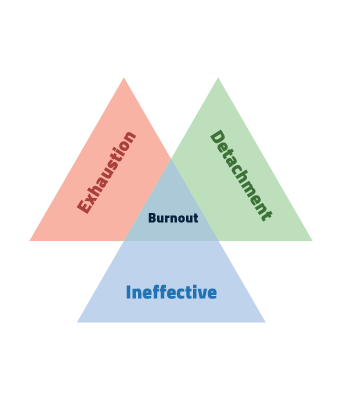Burnout: The Career Plague

Burnout is especially common in the aviation safety industry. I’ve seen it happen to young and older safety managers. I’ve seen it happen to safety managers who were early and late in their safety careers.
Burnout is not picky about whom it possesses, meaning that the burnout scope of victims naturally exceeds aviation safety professionals.
Low-to-moderate levels of burnout are a natural cycle that everyone goes through. In the aviation safety industry, it will be something that most, if not all, safety managers have to fight from time to time. It’s how a safety officer grows and finds a new sense of job satisfaction.
Related Aviation Safety Manager Articles
- 4 Ways to Know You Are Qualified to Be an Aviation Safety Officer
- 5 Types of Aviation Safety Managers
- Career Advice for Aspiring Aviation Safety Managers
Dangers of Safety Manager Burnout
But the hard part of being an aviation safety manager is that a little bit of burnout can quickly escalate, leaving the safety manager saying to himself, “Man, I really don’t like my job.”
This is very bad for:
- The safety officer;
- The organization's SMS implementation;
- the organization's safety culture; and
- Fellow coworkers
No pun intended, safety manager burnout is dangerous. So much of the present integrity, future integrity, and employee involvement in the SMS implementation ride on the shoulders of the safety officer. This only exacerbates burnout.
But what does burnout mean? What does it look like? How do you know if you are burnt out?
What Burnout Looks Like

Serious burnout usually means a combination of several things:
- Emotional/physical exhaustion
For example, being unable to focus on issues, having trouble staying awake, having little energy and/or patience to devote to tasks/people of the SMS implementation. Chronic illness and anxiety can also be a symptom here.
- Detachment, apathy, or cynicism
For example, not caring about the concerns and issues of employees, management, and the SMS implementation, and isolating yourself from them (i.e. taking many sick days, looking for reasons to be away from work). Or expressing a pessimistic or sarcastic attitude about the value of the organization's safety initiatives.
- Feelings of ineffectiveness
For example, feeling like you haven’t accomplished anything “substantial,” enacted important changes, or that your role isn’t very important.
In general, burnout is a combination of these three things – it’s a vicious cycle because each point exacerbates others.
Related Aviation Safety Management Articles
- Hardest Challenges of Safety Managers in Modern Aviation SMS
- How Do Aviation Safety Managers Prevent the Next Accident?
- Why/When Aviation Safety Managers Don't Need Operational Experience
Why It’s a Major Problem for Safety Officers
The workplace situation and duties of a safety officer are very unique across all the various aviation industry segments, such as airlines, airports, maintenance, flight schools, and air traffic control. In a way, a lead aviation safety officer’s role in his/her company deals with the same kinds of issues that the United States president does:
- Carries the weight of spearheading the health of the nation
- But depends substantially on those around him
- Takes all the blame, but carries little credit
- Is bound by many procedures and regulations
- Has to be intelligent, patient, have forethought, and yet also
- Has to be good with people
In other words, it’s a tough, stressful spot to be in. And incredibly demanding on one’s faculties.
It’s no surprise then that after years of pumping energy into an SMS implementation–
- Fighting resistance in management and amongst employees;
- Trying to please regulatory authorities and demanding client expectations;
- Developing a safety-conscious workplace;
- Perpetually striving toward continuous improvement; all the while
- Championing and cheerfully supporting the SMS implementation the whole time.
Is it any wonder that a safety manager loses energy?
It seems inevitable.
Couple this with the fact, that SMS is a process with no end, only improvement, and accomplishments/goals that the safety officer sets himself, the nature of each aviation SMS implementation is partially designed against a sense of satisfaction, or a sense of proud achievement embodied in the SMS champions.
Proactively Preventing Burnout

The common, motivational poster-type advice tells us to do things like, “work with a purpose,” “take control,” and “learn how to manage stress.”
Such advice is almost laughable. For one, I’m sure safety officers who are experiencing burnout are already trying those things, but furthermore, such advice is woefully nebulous. What does it really mean?
Fighting burnout means doing practical things.
Fortunately, aviation SMS managers, for the most part, have pretty good benefits and vacation time. Because of the amount of energy managed, an SMS implementation requires SMS managers have to be especially careful to:
- Have a healthy diet and sleeping habits
- Cultivate a strict work/life balance
- Take vacations
- Take sick days
Basically, make personal life choices that set up your aviation workplace as a zone where you can enter and be most efficient, and leave and not carry worries with you.
Making sure you take sick days when not well, using vacation, and setting strict work-hour habits is an extremely important part of being healthy and energized away from work so that you can have the requisite faculties in the aviation workspace.
Related Aviation Safety Management Articles
- How to Reduce Aviation SMS Risk When Safety Managers Quit
- 4 Things Safety Managers Do to Perform Well on Aviation SMS Audits
- How Aviation Safety Managers Can Deal With Silo Mentality
Final Thought
Here is a short list of things I’ve seen safety officers do in their aviation workplace that has helped them combat burnout.
- Setting small, tangible, trackable, and attainable goals
- Focus on relationships with employees
- Train employees to be more effective
- Plan for things thoroughly but
- Expect setbacks
- And learn to laugh at silly mistakes and learn from them
See what tasks safety managers do routinely. Here are some useful checklists.
Last updated in July 2025.







